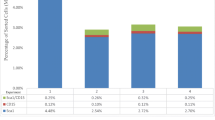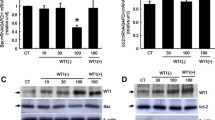Abstract
Objective
TO investigate the interdependent role of macrophage colony-stimulating factor (CSF-1) and its receptor (c-fms) on their induction and their role in granulosa cell tumorigenesis.
Methods
Normal ovarian granulosa cells were used to develop stable transfectants that overexpress CSF-1 or CSF-1/c-fms. CSF-1 was expressed under the control of tissue/cell specific α-inhibin promoter, and c-fms was expressed constitutively using a viral promoter. Stable transfectants were used to examine the effect of overexpression of these molecules on the proliferation, induction of autocrine loop, and tumorigenesis.
Results
Expression vectors were developed for CSF-1 and its receptor, c-fms, and used to generate stable transfects overexpressing these genes in granulosa cells. Data show that overexpression of CSF-1 leads to the induction of its receptor. Stable transfectants that overexpress CSF-1 show about a 2.5-fold increase in cell proliferation compared with normal granulosa cells, and these cells are also converted to anchorage-independent and tumorigenic phenotype. Using an antisense RNA approach, we also demonstrated that the increased cell proliferation is CSF-1 specific. Concomitant overexpression of CSF-1 and c-fms further results in increased cell proliferation (sixfold), rapid anchorage-independent growth, and aggressive tumor formation.
Conclusion
CSF-1 is capable of inducing its own receptor, and, similarly, the CSF-1 receptor, c-fms, can also induce its growth factor ligand. These studies also demonstrate the interdependent role of these genes in transformation of normal ovarian granulosa cells to a tumorigenic phenotype and suggest the possibility of a similar role for these genes in progression of ovarian cancer.
Similar content being viewed by others
References
Kacinski BM, Carter D, Mittal K, et al. High level expression of fins proto-oncogene mRNA is observed in clinically aggressive human endometrial adenocarcinomas. Int J Radiat Oncol Biol Phys 1988;15:823–9.
Kacinski BM, Carter D, Mittal K, et al. Ovarian adenocarcinomas express fms complementary transcripts and fms antigen, often with coexpression of CSF-1. Am J Pathol 1990;137:135–47.
Ramaknshnan S, Xu FJ, Brandt SJ, Neidel JE, Bast RC, Brown EL. Constitutive production of macrophage colony-stimulating factor by human ovarian and breast cancer cell lines. J Clin Invest 1989;83:921–6.
Filderman AE, Bruckner A, Kacinski BM, Deng N, Remold HG. Macrophage colony-stimulating factor (CSF-1) enhances invasiveness in CSF-1 receptor-positive carcinoma cell lines. Cancer Res 1992;52:3661–6.
Kacinski BM, Carter D, Kohorn EI, et al. Oncogene expression in vivo by ovarian adenocarcinomas and mixed-müllerian tumors. Yale J Biol Med 1989;62:379–92.
Kacinski BM, Chambers SK, Carter D, Filderman AE, Stanley ER. The macrophage colony stimulating factor CSF-1, an auto-and paracrine tumor cytokine is also a circulating “tumor marker” in patients with ovarian, endometrial and pulmonary neoplasms. In: Dinarello CA, Kluger MJ, Powanda MC, Oppenheim JJ. eds. The physiological and pathological effects of cytokines. New York: Wiley-Liss, 1990:393–400.
Scholl SM, Pallud C, Reuvon F, et al. Anti-colony stimulating factor-1 antibody staining in primary breast adenocarcinomas correlates with marked inflammatory cell infiltrates and prognosis. J Natl Cancer Inst 1994;86:120–6.
Tang R, Beuron F, Ojeda M, Mosseri V, Pouillart P, Schodd S. M-CSF and M-CSF-receptor expression by breast tumor cells: M-CSF mediated recruitment of tumor infiltrating monocytes. J Cell Biochem 1992;50:350–1.
Chambers SK, Wang Y, Gertz RE, Kacinski BM. Macrophage colony-stimulating factor mediates invasion of ovarian cancer cells through urokinase. Cancer Res 1995;55:1578–85.
Roussel MF, Dull TJ, Rettenmier CW, Ralph P, Ullrich A, Sherr CJ. Transforming potential of the c-fms proto-oncogene (CSF-1 receptor). Nature 1987;325:549–52.
Sherr CJ. The fms oncogene. Biochem Biophys Acta 1988;948: 225–43.
Wheeler EF, Rettenmier CW, Look AT, Sherr CJ. The v-fms oncogene induces factor independence tumorigenicity in CSF-1 dependent macrophage cell line. Nature 1986;324:377–80.
Wheeler EF, Askew D, May S, Ihle JN, Sheer CJ. The v-fms oncogene induces factor-independent growth and transformation of the interleukin-3-dependent myeloid cell line FDC-P1. Mol Cell Biol 1987;7:1673–80.
Rettenmeier CW, Roussel MF, Ashumun RA, Ralph P, Price K, Sherr CJ. Synthesis of membrane-bound colony-stimulating factor (CSF-1) and down modulation of CSF-1 receptors in NIH 3T3 cells transformed by cotransfection of the human CSF-1 and c-fms (CSF-1 receptor) genes. Mol Cell Biol 1987;7:2378–87.
Taylor GR, Reedijk M, Rothwell V, Rohrschneider L, Pawson T. The unique insert of cellular and viral fms protein tyrosine kinase domains is dispensable for enzymatic and transforming activities. EMBO J 1989;8:2029–37.
Rohrschneider LR, Bourette RP, Lioubin MN, Algate PA, Myles GM, Carlberg K. Growth and differentiation of signals regulated by the M-CSF receptor. Mol Reprod Dev 1997;46: 96–103.
Suzuki M, Sekiguchi I, Ohwada M, et al. Expression of c-fms proto-oncogene product by ovarian cancer cell lines with effects of macrophage colony-stimulating factor on proliferation. Oncology 1996;53:99–103.
Krupitza G, Fritsche R, Dittrich E, et al. Macrophage colony-stimulating factor is expressed by an ovarian carcinoma subline and stimulates the c-myc proto-oncogene. Br J Cancer 1995;72: 35–40.
Favot P, Yue X, Hume DA. Regulation of the c-fms promoter in murine tumor cell lines. Oncogene 1985;11:1371–81.
Bruckner A, Filderman AE, Kircheimer JC, Bindr BR, Renold, HG. Endogenous receptor-bound urokinase mediates tissue invasion of the human lung carcinoma cell lines A549 and Calu-1. Cancer Res 1992;52:3043–7.
Katabuchi H, Fukumatsu Y, Araki M, et al. Role of macrophages in ovarian follicular development. Horm Res 1996;46:45–51.
Lee F, Mulligan R, Ringold G. Glucocorticoids regulate expression of dihydrofolate reductase cDNA in mouse mammary tumor virus chimeric plasmids. Nature (London) 1981;294:228–32.
Tekmal RR, Bums WN, Rao DV, et al. Regulation of rat granulosa cell α-inhibin expression by luteinizing hormone, estradiol, and progesterone. Am J Obstet Gynecol 1996;175: 420–7.
Feng ZM, Li YP, Chen CL. Analysis of the 5′-flanking regions of rat inhibin α- and β-subunit genes suggests two different regulatory mechanisms. Mol Endocrinol 1989;3:1914–25.
Ladner MB. Martin GA, Noble JA, et al. cDNA cloning and expression of murine macrophage colony-stimulating factor from L929 cells. Proc Natl Acad Sci USA 1988;85:6706–10.
Rothwell VM, Rohrschneider LR. Murine c-fms cDNA: cloning, sequence analysis and retroviral expression. Oncogene Res 1987;1:311–24.
Rohrschneider LR, Metcalf D. Induction of macrophage colony stimulating factor-dependent growth and differentiation after induction of the murine c-fms gene into FDC-P1 cells. Mol Cell Biol 1989;9:5081–92.
Stein S, Stoica G, Tilley R, Burghard RC. Rat ovarian granulosa cell culture: a model system for the study of cell-cell communication during multi step transformation. Cancer Res 1991;51: 696–706.
Macpherson I, Montagnier L. Agar suspension culture for the selective assay of cells transformed by polyoma virus. Virology 1964;23:291–4.
Rohrschneider LR, Rothwell VM, Nicola NA. Transformation of murine fibroblasts by a retrovirus encoding the murine c-fms proto-oncogene. Oncogene 1989;4:1015–22.
Morgan C, Pollard JW, Stanley ER. Isolation and characterization of a cloned growth factor dependent macrophage cell line, BAC1.2F5. J Cell Physiol 1987;130:420–7.
Kacmski BM, Scata KA, Carter D, et al. FMS (CSF-1 receptor) and CSF-1 transcripts and protein are expressed by human breast carcinomas in vivo and in vitro. Oncogene 1991;6:941–52.
Roberts WM, Shapiro LH, Ashmun RA, Look TA. Transcription of the human colony-stimulating factor-1 receptor gene is regulated by separate tissue-specific promoters. Blood 1992;79: 586–93.
Sapi E, Flick MB, Rodov S, et al. Independent regulation of invasion and anchorage-independent growth by different auto-phosphorylation sites of the macrophage colony-stimulating factor 1 receptor. Cancer Res 1996;56:5704–12.
Borycki AG, Foucrier J, Saffer L, Leibovitch SA. Repression of the CSF-1 receptor (c-fms proto-oncogene product) by antisense transfection induces Gl growth arrest in L6al rat myoblasts. Oncogene 1995;10:1799–1811.
Author information
Authors and Affiliations
Corresponding author
Additional information
The authors thank Dr. George Stoica for providing SIGC cell line, Dr. Dirk Dillehay for histopathologic evaluation, and Dr. Neil Sidell for critical evaluation of the manuscript.
Rights and permissions
About this article
Cite this article
Keshava, N., Gubba, S. & Tekmal, R.R. Overexpression of Macrophage Colony-Stimulating Factor (CSF-1) and Its Receptor, c-fms, in Normal Ovarian Granulosa Cells Leads to Cell Proliferation and Tumorigenesis. Reprod. Sci. 6, 41–49 (1999). https://doi.org/10.1177/107155769900600109
Published:
Issue Date:
DOI: https://doi.org/10.1177/107155769900600109




